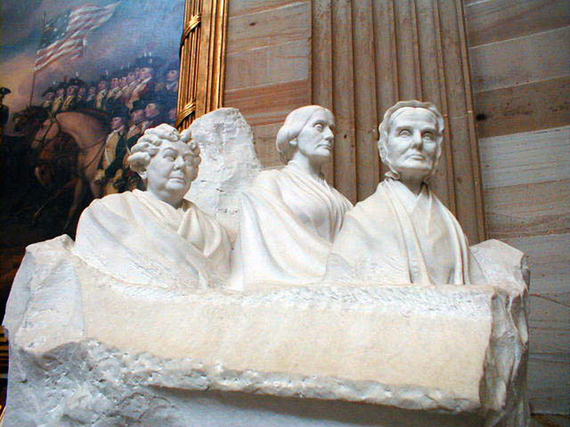
After 18 years of lobbying to create a national women's history museum in our nation's capital, Congress has approved the formation of a privately funded, bi-partisan commission to study and produce a plan for the Museum. (NWHM pursued the creation of a commission in hopes of securing a site on or adjacent to the National Mall - our nation's premier symbolic space.) Throughout the nearly two decades I've spent working to build the museum there have been some who question whether or not physical museums are still necessary or even relevant. To that, I say, they most certainly are!
In his fascinating Ted Talk "Weaving Narratives in Museum Galleries," Metropolitan Museum of Art president, Thomas Campbell says "Nothing replaces the authenticity of the object presented with passionate scholarship. Bringing people face-to-face with our objects is a way of bringing them face-to-face with people across time, across space, whose lives may have been different from our own but who, like us, have hopes and dreams, frustrations and achievements in their lives."
This reminded me of a visit to Susan B. Anthony's home in upstate New York some years ago. While working to convince Congress to move the 7-ton Portrait Monument of leading suffragists Susan B. Anthony, Elizabeth Cady Stanton and Lucretia Mott from the Capitol Crypt to the Rotunda, I became very familiar with Susan's life story. However, upon entering her home something changed. I specifically remember viewing one of her dresses displayed on a mannequin and becoming immediately aware of the fact that this fireball of a woman was in fact, quite petite. I began to see her as the living, breathing woman she had been, rather than just the heroine I had read about. That was 20 years ago and I recall it as though it was yesterday. It is said that museums bring history to life and that's certainly been my experience.
Seeing something in person is quite different than seeing it on the pages of a book or on a computer screen. In fact, research shows that those who have firsthand experience are more likely to retain it later in life. Nothing compares to seeing something with your own eyes. (Think Mona Lisa or Ruby Slippers!)
In a 1999 lecture, the late Emmanuel N. Arinze, President of the Commonwealth Association of Museums stated that museums "hold the cultural wealth of the nation in trust for all generations and by its function and unique position, have become the cultural conscience of the nations."
Museums ensure understanding and appreciation for various groups and cultures. They promote better understanding of our collective heritage and foster dialogue, curiosity and self-reflection . Further, they serve to help future generations comprehend their history and recognize the achievements of those who came before them.
Yes, indeed! Museums are both necessary and relevant today. They are the institutions charged with conserving, protecting and displaying artifacts from our past and thus preserving our rich heritage which might otherwise be lost to private collectors or to time itself. Quite simply, without museums we would most certainly lose the tangible links to our past.
In this light, the case for a national women's history museum becomes even more crucial. A museum to preserve the depth and breadth of women's unique heritage is desperately needed (One does not currently exist.) A better understanding of 51% of our population will benefit our nation and the world for generations to come.